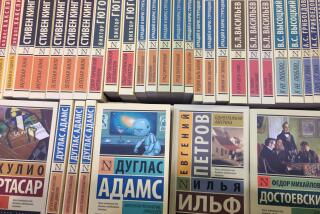SOVIET UNION : When Facts Become Fiction : The publishers of the Great Soviet Encyclopedia have a dilemma--’We want to tell the truth, but we don’t know where it lies anymore.’
- Share via
MOSCOW — They have known hard times before, the makers of Soviet encyclopedias.
There were all those awkward junctures such as the time when Josef Stalin’s infamous chief of the secret police, Lavrenti Beria, fell into disgrace and all Great Soviet Encyclopedia owners were ordered to cut his entry out of the “B” volume and paste in more than anyone could ever want to know about the Bering Strait.
And for decades, the compilers of Soviet facts labored under the control of Communist Party ideologues who as recently as 1989 pushed them to produce entries that called Bolshevik founder V.I. Lenin “the great leader and teacher of the workers of the whole world” and communism “the social structure that replaces capitalism.”
But in some ways, they have never known such hard times as these.
It is terribly difficult, the scholar-editors of the Soviet Encyclopedia publishing firm acknowledge, to put out an encyclopedia when you cannot even be sure what the name of your own country will be by the time the book hits the shelves.
“Even Mikhail Gorbachev doesn’t know the answer to that question,” said Alexander Gorkin, first deputy director of the Soviet Encyclopedia firm, which publishes the Great Soviet Encyclopedia, a dictionary and other reference works.
Amid the current volcanic change in what was once the somnolent Soviet Union, many of the fundamental facts that are encyclopedists’ stock in trade are in flux. “We want to tell the truth, but we don’t know where it lies anymore,” said Andrei Zaitsev, deputy editor in chief and head of Soviet Encyclopedia’s history department. “And not only don’t we know, but historians don’t know it either.”
Since the A-N volume of the Great Encyclopedic Dictionary came out this summer, the three Baltic republics became officially independent, the very existence of the Soviet Union as a country came into doubt, the Communist Party was banned and Leningrad again became St. Petersburg.
Rafts of questions arise. What exactly was Stalinism? What were the facts and true figures of agricultural collectivization? Which of Stalin’s henchmen should be labeled an “organizer of mass repressions?” How should socialism be defined? Communism? Should America still be considered “controlled by major monopolistic capital?” Which Communist Party officials and works of Karl Marx truly deserve mention?
To write these new kinds of articles, the encyclopedia editors need a new kind of scholar, a historian who does not wear the ideological blinders of the past. At times, Zaitsev said, he has simply been unable to find historians capable of writing the entries a reference work needs. And another new problem besets the compilers: With the disappearance of the party line, scholars’ and editors’ political views vary from the far left to the far right and have a tendency to make their way into the texts.
In the country’s current state, Soviet Encyclopedia’s editors cannot even contemplate undertaking a new edition of their masterpiece, the Great Soviet Encyclopedia, a collection that has been published thrice since the 1917 Communist Revolution--once in no fewer than 57 tomes--and carries the status here of the Encyclopedia Britannica.
Maybe, they say, by the end of the century, when the country’s economy is stabilizing, it will be time for a new multi-volume work on the scale of the Great Soviet Encyclopedia.
Only it will probably be called the Great Russian Encyclopedia. . . .
More to Read
Sign up for Essential California
The most important California stories and recommendations in your inbox every morning.
You may occasionally receive promotional content from the Los Angeles Times.









